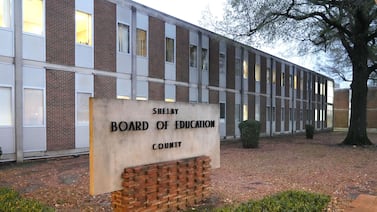Sign up for Chalkbeat Philadelphia’s free newsletter to keep up with news on the city’s public school system.
Pennsylvania’s new $50.1 billion state budget — four months overdue — includes a $193 million increase for Philadelphia schools, and several accountability reforms for cyber charter schools and districts’ literacy programs.
The budget and accompanying school code bills reduce the amount that school districts pay cyber charters, while also adding stricter reporting requirements for those schools regarding student absenteeism and academic performance. School districts statewide will also have to adopt “evidence-based” reading curriculum by the 2027-28 school year and do more to support struggling readers.
The budget package also includes $25 million for child care teacher recruitment and retention bonuses; a $7.5 million increase for Grow PA, which gives scholarships to aspiring educators; $30 million for student-teacher stipends; a non-punitive push for students to complete their college financial aid forms prior to graduation; and a $50 cap on teacher certification fees.
Democratic Gov. Josh Shapiro signed the budget package Wednesday afternoon, flanked by Rep. Jordan Harris and House Speaker Joanna McClinton, both Democrats who represent Philadelphia.
“This budget builds on the progress we’ve made to be able to deliver better schools and more opportunity for our kids,” Shapiro said.
In an increasingly polarized and combative political environment, Pennsylvania officials cast their budget agreement Wednesday as a moment of unity for a divided legislature. It also gives badly needed financial relief to the state’s school districts, which resorted to various unappealing tactics like short-term borrowing to keep things running while they waited for state education funding — a situation that one observer likened to setting money on fire.
“We are voting on a budget today that continues to make historic investments in education,” said Harris, the House appropriations committee chair, before the vote in Harrisburg Wednesday. “It’s taken us a long time to get here, but the truth of the matter is we’re here and we’re here together.”
Education spending had been a central sticking point in budget negotiations. But in the shadow of a federal government shutdown and decisive election wins by Democrats this month in many races, Pennsylvania lawmakers said this budget will send a clear political message: We’re capable of compromising.
“I don’t agree with everything in this budget — that’s part of a divided government,” said Republican Rep. Jesse Topper on the House floor Wednesday. But he said he thinks the “robust” increases in education spending with the added requirements that districts adopt “evidence-based” literacy programs “will make a difference” for Pennsylvania students.
While the budget deal does not create a new private school voucher program that Republicans sought, Topper praised the $50 million increase in funding the budget allocates for the state’s existing school choice program that relies on tax credits.
In the absence of a state budget, the Philadelphia district borrowed $585.5 million to allow it to continue to function and will need to pay that money back, in addition to finding funding for the interest payments. A bill pending in the legislature would require the state to pay districts back for “interest payments and fees” stemming from lawmakers’ inability to pass a budget on time.
However, the Teach Plus advocacy group expressed concern that districts will not ultimately get reimbursed for interest they paid on any such borrowing. “That money will never reach classrooms and students, and local taxpayers will shoulder this unnecessary expense,” Teach Plus said in a Wednesday statement.
Philly district officials are also undergoing a complex facilities planning process that will result in school closures and require millions for renovations and building maintenance. The new budget includes $125 million for school facilities funding.
Budget addresses Pennsylvania’s school funding ‘adequacy gap’
This marks the second state budget since a state court ruled in 2023 that Pennsylvania’s previous school funding formula was unconstitutional because it left poor districts underfunded.
Following that ruling, a bipartisan commission crafted a new funding formula to consider districts’ tax bases and students’ needs to distribute funds. The new budget largely follows that formula and boosts funding for the state’s poorest districts.
“This budget responds to the mandates of our constitutional court to address the issues of inadequacy and equity,” said Sen. Vincent Hughes, a Democrat who represents Philadelphia, on the Senate floor Wednesday.
Still, advocates say the additional funding does not fully address Pennsylvania schools’ needs.
“Lawmakers’ five-month delay in passing this year’s budget left schools, educators, and families in unnecessary limbo and resulted in avoidable harm,” said Deborah Gordon Klehr, executive director of the Education Law Center-PA, in a statement. “This is another step forward – one that must be followed by continued commitment and sustained investment until every student, in every community, has the resources they need to learn and thrive.”
Cyber charter reforms will save Philadelphia district millions
Pennsylvania school districts previously have paid cyber charter schools the same amount per student as they provided to brick-and-mortar charters. But the new budget changes that, lowering the amount of money districts owe charters per student. Those changes are estimated to save the Philadelphia school district nearly $50 million this school year, according to an analysis from the House Appropriations Committee.
This year’s reforms replace last year’s $100 million payment to reimburse school districts for the cost of tuition paid to cyber charter schools.
Cyber charter schools will also be required to create policies that monitor whether students are present during synchronous parts of instruction. To be marked present, students “must be visible to the teacher on camera,” the budget bill states. For asynchronous instruction, when teachers are not live on camera, cyber charters will be required to monitor how students are progressing on certain “benchmarks” and report that information to the state.
In addition, cyber charters will have to create wellness check policies to “ensure the well-being” of enrolled students. These changes come after the death of a student enrolled in a cyber charter following her alleged torture and starvation by her guardians.
The budget legislation also prohibits students who are habitually truant from transferring during the school year to a cyber charter school, unless a judge determines that the transfer is in the child’s best interest.
Cyber charter operators said in a joint statement Wednesday the reforms would amount to a significant budget cut and could force up to seven cyber charter schools to close within two years. And they estimate the budget deal would lead to layoffs of 2,000 cyber charter teachers and staff.
Jon Marsh, CEO of Esperanza Cyber Charter School based in North Philly, said in a Wednesday statement that the budget represented “an attack on some of the most chronically disenfranchised and disadvantaged students in our Commonwealth.”
Carly Sitrin is the bureau chief for Chalkbeat Philadelphia. Contact Carly at csitrin@chalkbeat.org.
Rebecca Redelmeier is a reporter at Chalkbeat Philadelphia. She writes about public schools, early childhood education, and issues that affect students, families, and educators across Philadelphia. Contact Rebecca at rredelmeier@chalkbeat.org.







